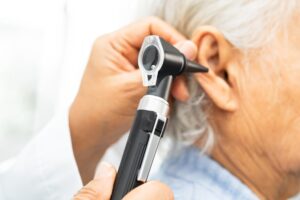New AirPods Features vs. Traditional Hearing Aids
In recent years, more so than probably any other time in history, the line between consumer electronics and medical devices has basically been washed away. One of the most talked about innovations has been Apple’s recent announcement regarding new capabilities for their AirPods Pro line, essentially transforming them into over-the-counter (OTC) hearing aids for the masses. This has sparked excitement and conversations, so let’s take a closer look at what this might mean for you and your hearing health.
More Than Just Music: The AirPods Revolution
One of the most popular consumer electronics of the first part of this century, AirPods have certainly evolved since their introduction. With the latest updates, these tiny marvels now offer many features that were once exclusive to the medical market. Some recent updates to their capabilities as hearing aids include:
- Hearing Tests: AirPod users will soon be able to test their basic hearing directly from their devices.
- Sound Amplification: AirPods Pro 2 can now also amplify ambient sounds, making it easier for those with mild or moderate hearing loss to better engage the world around them.
- Customizable Settings: Along with an iOS device, users are able to adjust many of the settings based on their personal preferences and needs.
While certainly exciting, it’s important to understand both the potential benefits and limitations of using the AirPods Pro 2 in place of normal hearing aids.
Weighing the Pros and Cons of AirPods as Hearing Aids
The Pros: Accessibility and Awareness
There are a myriad of useful features that bring several positive benefits to AirPods users:
- Increased Accessibility: Adding these features to devices that millions of people are already enjoying helps to make this technology more accessible to those who might benefit from it.
- Reduced Stigma: Because AirPods don’t look like traditional hearing aids, their use can help many overcome any stigma or embarrassment regarding their hearing loss.
- Early Intervention: Making these features available might encourage users to address their hearing concerns earlier, potentially improving their treatment outcomes.
- Raising Awareness: With these developments, Apple hopes to make the conversations around hearing health more mainstream.
The Cons: One Size Doesn’t Fit All
While AirPods Pro 2’s newest features are impressive, they’re not without their limitations:
- Limited Amplification: They may not be able to provide sufficient amplification for those experiencing severe hearing loss.
- Battery Life Concerns: The power demands of continuous sound processing can significantly and negatively affect your device’s battery life.
- Lack of Professional Fitting: Unlike traditional hearing aids, AirPods Pro 2 aren’t custom-fitted to an individual’s ear canal, which can impact sound quality and comfort.
- Potential for Overamplification: Without professional guidance, users might end up setting their volumes too high, potentially causing further damage to their hearing.
Safe Usage for AirPods Pro 2
To minimize potential risks when using the AirPods Pro 2 as hearing aids, you should:
- Start with a lower volume level and gradually adjust up
- Take regular breaks from amplification
- Check battery levels to prevent sudden changes in sound
- Be mindful about prolonged use in noisy environments
Unsure if AirPods are right for your hearing needs? Schedule a personalized hearing assessment with our team of experts today!
The Importance of Professional Hearing Care
It’s sometimes difficult to express the value of professional hearing care. While the AirPods Pro 2’s new hearing aid features are an exciting development, they can’t replace a comprehensive hearing evaluation and personalized treatment plan. Here’s why:
- Much like any other medical issue, there are varieties to hearing loss. A professional hearing test can provide an accurate diagnosis of the type and degree of hearing loss, which is critical for effective treatment.
- Our team of audiologists can provide customized solutions through hearing aids that are precisely programmed to your specific hearing profile.
- Regular check-ups ensure your hearing aids can evolve to meet your needs as your hearing changes over time.
- Professional hearing care means access to experts who can offer strategies for protecting your hearing and managing your condition in various environments and conditions.
Questions for Your Audiologist
When exploring your options for hearing assistance, consider asking the following during your appointment:
- What is the ideal level of amplification for my specific hearing loss type?
- What safety guidelines should I follow when using assistive hearing devices?
- What environments might be challenging for a hearing device like the AirPods Pro 2?
What to Look for in Professional Hearing Aids
Professional hearing aids offer a number of overlapping benefits with over the counter models and the AirPods Pro 2, but some unique features to look for in dedicated hearing aids include:
- Precise customization to your specific hearing profile
- Optimal sound quality and comfort
- Long-lasting battery life for continuous use
- Versatile features that are adaptable to diverse environments
Professional hearing care provides patients with a wide range of benefits that extend far beyond hearing aids. Professional care gives patients:
- Accurate diagnosis of hearing loss type and degree
- Customized solutions precisely programmed for your hearing needs
- Regular check-ups to update your devices to meet your evolving needs
- Expert strategies and support for your hearing and assisted hearing management.
The Future of Hearing Technology
Adding hearing assistance to consumer devices like the AirPods Pro 2 is an exciting development and represents a significant step towards making assistive hearing technology more available. While an exciting development, it’s important to recognize that these advancements are complementary to, rather than replacements for, professional hearing care.
Common Questions About Using AirPods Pro 2 as Hearing Aids
Q. Can AirPods really replace traditional hearing aids?
- While the latest generation of AirPods Pro can be helpful for some people with mild hearing loss, they’re not a full replacement for traditional hearing aids, especially for those experiencing moderate to severe hearing loss.
Q. Do I still need to see an audiologist if I use AirPods for hearing assistance?
- Yes. It’s still valuable and important to check your hearing regularly with our team of professionals. We provide you with a comprehensive evaluation of your hearing health and work with you to develop personalized strategies for minimizing hearing loss’ impact on your daily life.
Q. Are AirPods Pro 2 FDA-approved as hearing aids?
- As of the writing of this post the AirPods Pro 2 are not FDA-approved as hearing aids. They fall under the category of Personal Sound Amplification Products (PSAPs).
Q. How do AirPods compare to over-the-counter hearing aids?
- The AirPods Pro 2 with hearing features work similarly to some over-the-counter hearing aids in terms of accessibility, but they may not offer the same level of customization or amplification as dedicated OTC devices.
Q. Can using AirPods as hearing aids damage my hearing?
- If used improperly, (like listening at too high volumes), any in-ear amplification device like the AirPods Pro 2 can cause potentially permanent hearing damage. Another reason professional guidance is so crucial to successful outcomes.
–
The introduction of hearing aid features in the newest generation of AirPods Pro marks an exciting development in hearing health technology. While it’s expanding access and raising awareness about hearing health, it’s important to remember that hearing care isn’t one-size-fits-all.
While AirPods can be a valuable tool for some, they shouldn’t be used to replace professional hearing care. As we embrace these new technologies, let’s also prioritize comprehensive hearing health for improved outcomes.
Contact us today to schedule an appointment with our team of experts and see how many more doors you can open with professional hearing care.




